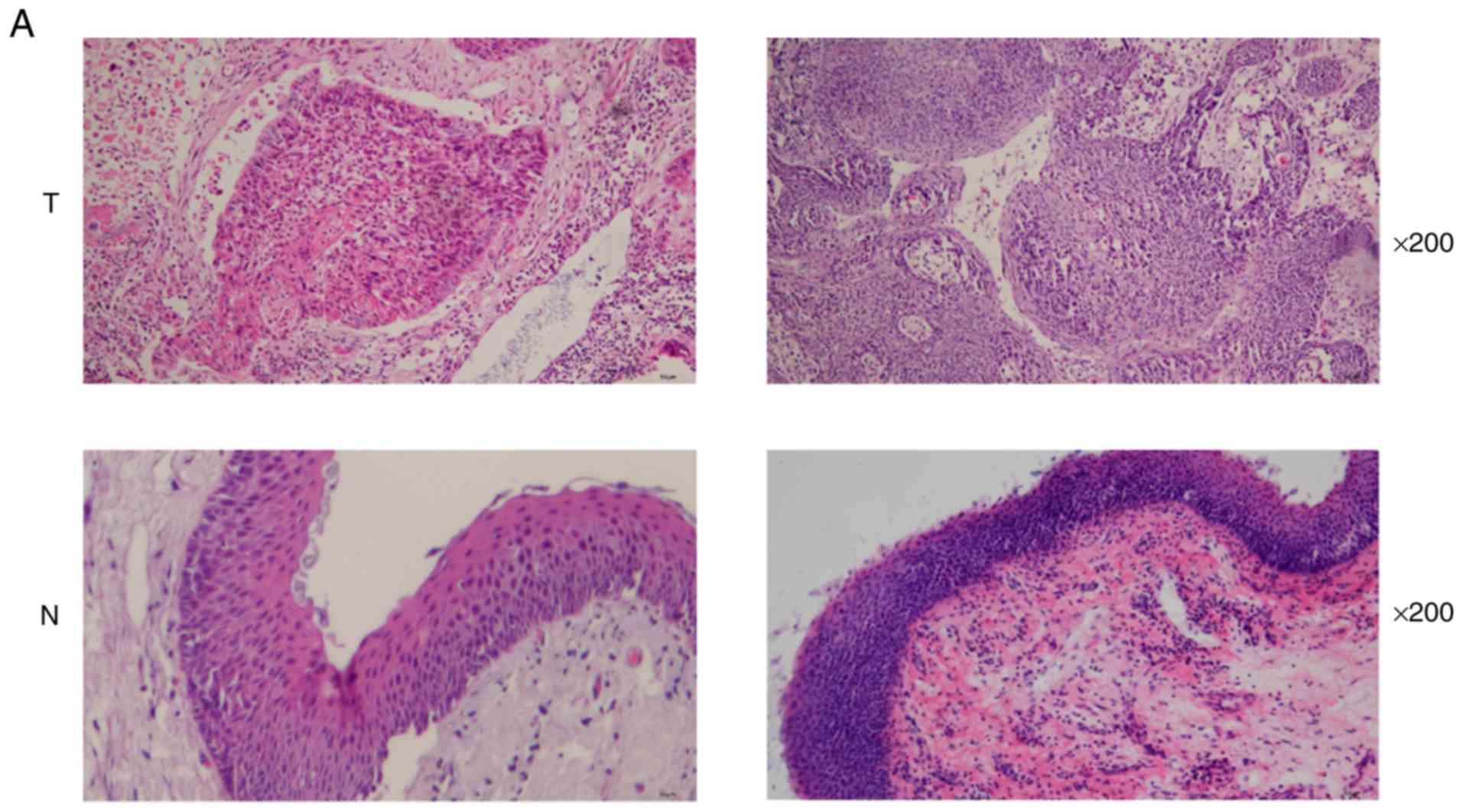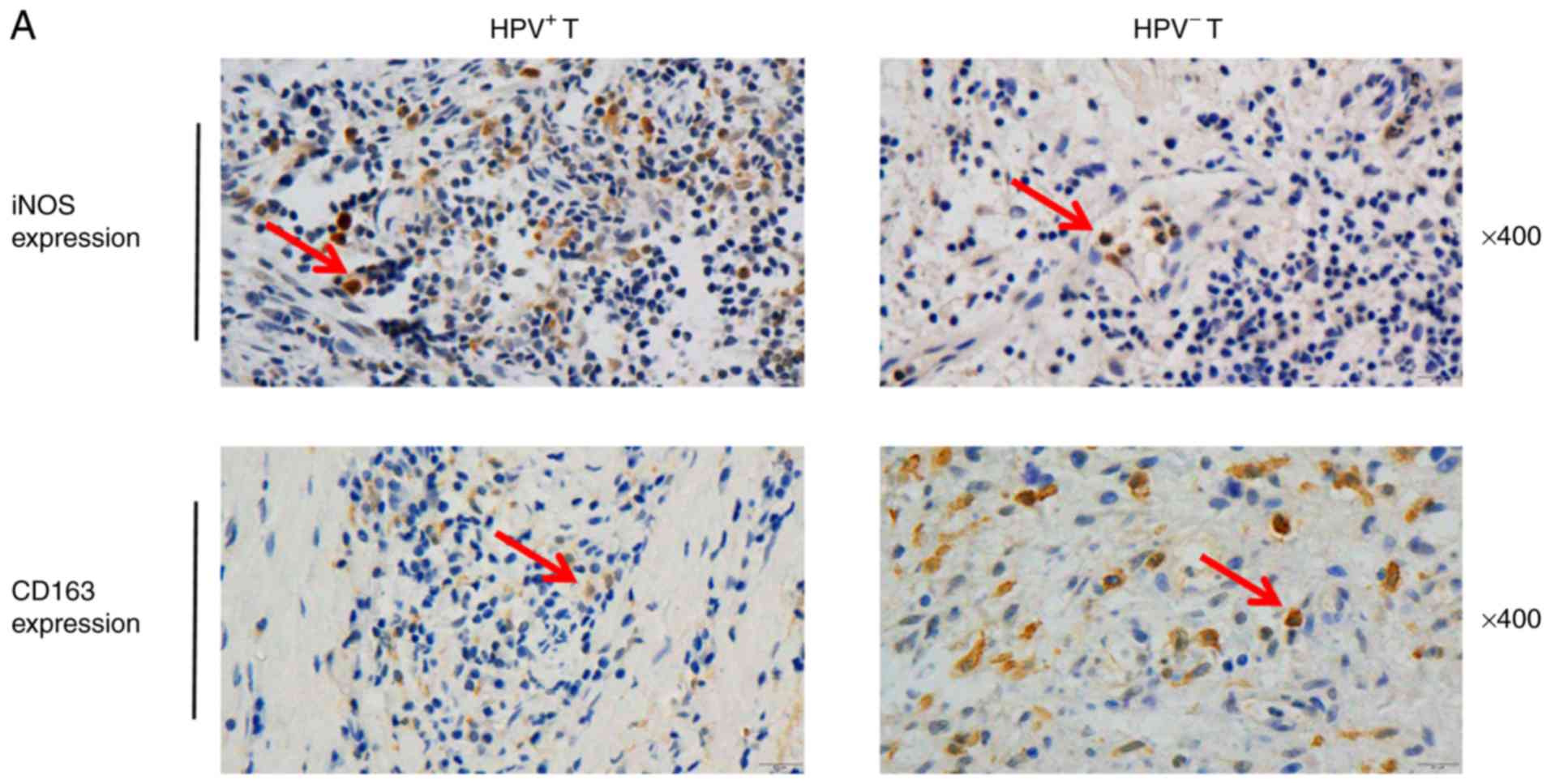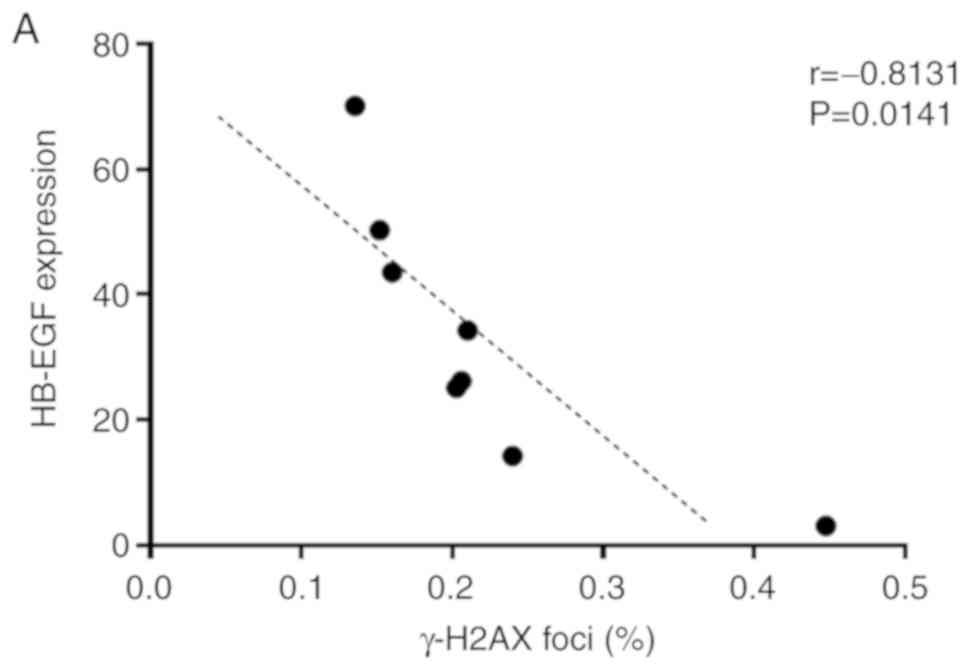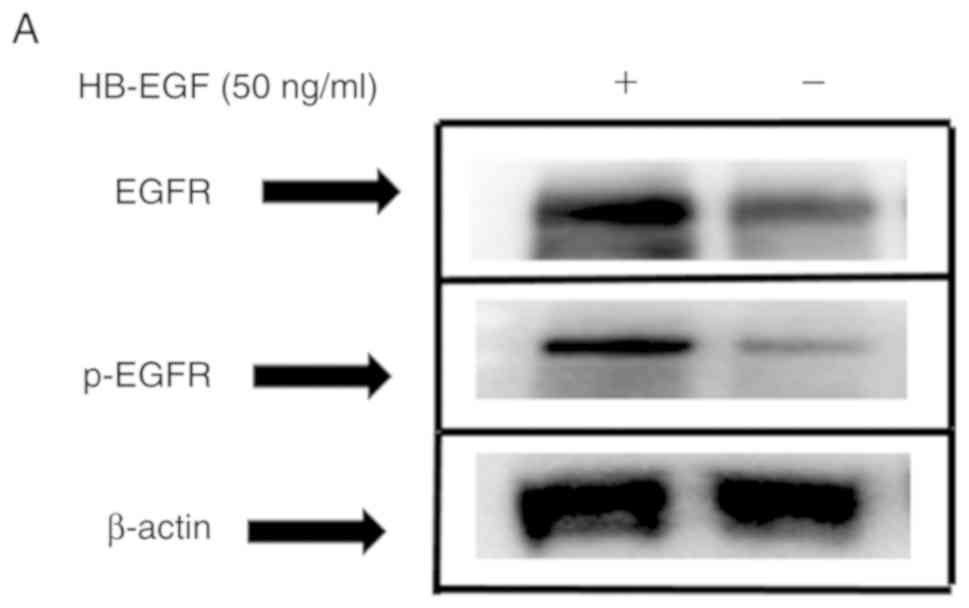|
1
|
Torre LA, Bray F, Siegel RL, Ferlay J,
Lortet-Tieulent J and Jemal A: Global cancer statistics, 2012. CA
Cancer J Clin. 65:87–108. 2015. View Article : Google Scholar : PubMed/NCBI
|
|
2
|
Park S, Jang WJ and Jeong CH:
Nano-biomechanical validation of epithelial-mesenchymal transition
in oral squamous cell carcinomas. Biol Pharm Bull. 39:1488–1495.
2016. View Article : Google Scholar : PubMed/NCBI
|
|
3
|
Solomon B, Young RJ and Rischin D: Head
and neck squamous cell carcinoma: Genomics and emerging biomarkers
for immunomodulatory cancer treatments. Semin Cancer Biol.
52:228–240. 2018. View Article : Google Scholar : PubMed/NCBI
|
|
4
|
Mosca L, Pagano M, Ilisso CP, Cave DD,
Desiderio V, Mele L, Caraglia M, Cacciapuoti G and Porcelli M:
AdoMet triggers apoptosis in head and neck squamous cancer by
inducing ER stress and potentiates cell sensitivity to cisplatin. J
Cell Physiol. 234:13277–13291. 2019. View Article : Google Scholar : PubMed/NCBI
|
|
5
|
Marur S and Forastiere AA: Head and neck
squamous cell carcinoma: Update on epidemiology, diagnosis, and
treatment. Mayo Clin Proc. 91:386–396. 2016. View Article : Google Scholar : PubMed/NCBI
|
|
6
|
Ou D, Adam J, Garberis I, Blanchard P,
Nguyen F, Levy A, Casiraghi O, Gorphe P, Breuskin I, Janot F, et
al: Influence of tumor-associated macrophages and HLA class I
expression according to HPV status in head and neck cancer patients
receiving chemo/bioradiotherapy. Radiother Oncol. 130:89–96. 2019.
View Article : Google Scholar : PubMed/NCBI
|
|
7
|
Mirghani H, Amen F, Tao Y, Deutsch E and
Levy A: Increased radiosensitivity of HPV-positive head and neck
cancers: Molecular basis and therapeutic perspectives. Cancer Treat
Rev. 41:844–852. 2015. View Article : Google Scholar : PubMed/NCBI
|
|
8
|
Tian L, Yi X, Dong Z, Xu J, Liang C, Chao
Y, Wang Y, Yang K and Liu Z: Calcium bisphosphonate nanoparticles
with chelator-free radiolabeling to deplete tumor-associated
macrophages for enhanced cancer radioisotope therapy. ACS Nano.
12:11541–11551. 2018. View Article : Google Scholar : PubMed/NCBI
|
|
9
|
She L, Qin Y, Wang J, Liu C, Zhu G, Li G,
Wei M, Chen C, Liu G, Zhang D, et al: Tumor-associated macrophages
derived CCL18 promotes metastasis in squamous cell carcinoma of the
head and neck. Cancer Cell Int. 18:1202018. View Article : Google Scholar : PubMed/NCBI
|
|
10
|
Barikbin R, Berkhout L, Bolik J,
Schmidt-Arras D, Ernst T, Ittrich H, Adam G, Parplys A, Casar C,
Krech T, Karimi K, et al: Early heme oxygenase 1 induction delays
tumour initiation and enhances DNA damage repair in liver
macrophages of Mdr2−/− mice. Sci Rep. 8:162382018.
View Article : Google Scholar : PubMed/NCBI
|
|
11
|
Vitale I, Manic G, Coussens LM, Kroemer G
and Galluzzi L: Macrophages and metabolism in the tumor
microenvironment. Cell Metab. 30:36–50. 2019. View Article : Google Scholar : PubMed/NCBI
|
|
12
|
Petty AJ and Yang Y: Tumor-associated
macrophages: Implications in cancer immunotherapy. Immunotherapy.
9:289–302. 2017. View Article : Google Scholar : PubMed/NCBI
|
|
13
|
Chen X, Yan B, Lou H, Shen Z, Tong F, Zhai
A, Wei L and Zhang F: Immunological network analysis in HPV
associated head and neck squamous cancer and implications for
disease prognosis. Mol Immunol. 96:28–36. 2018. View Article : Google Scholar : PubMed/NCBI
|
|
14
|
Lau SK, Chu PG and Weiss LM: CD163: A
specific marker of macrophages in paraffin-embedded tissue samples.
Am J Clin Pathol. 122:794–801. 2004. View Article : Google Scholar : PubMed/NCBI
|
|
15
|
Li C, Shintani S, Terakado N, Nakashiro K
and Hamakawa H: Infiltration of tumor-associated macrophages in
human oral squamous cell carcinoma. Oncol Rep. 9:1219–1223.
2002.PubMed/NCBI
|
|
16
|
Galdiero MR, Bonavita E, Barajon I,
Garlanda C, Mantovani A and Jaillon S: Tumor associated macrophages
and neutrophils in cancer. Immunobiology. 218:1402–1410. 2013.
View Article : Google Scholar : PubMed/NCBI
|
|
17
|
Chen X, Fu E, Lou H, Mao X, Yan B, Tong F,
Sun J and Wei L: IL-6 induced M1 type macrophage polarization
increases radiosensitivity in HPV positive head and neck cancer.
Cancer Lett. 456:69–79. 2019. View Article : Google Scholar : PubMed/NCBI
|
|
18
|
Geiger-Maor A, Guedj A, Even-Ram S, Smith
Y, Galun E and Rachmilewitz J: Macrophages regulate the systemic
response to DNA damage by a cell nonautonomous mechanism. Cancer
Res. 75:2663–2673. 2015. View Article : Google Scholar : PubMed/NCBI
|
|
19
|
Fulcher CD, Haigentz M Jr and Ow TJ;
Education Committee of the American Head Neck Society (AHNS), :
AHNS Series: Do you know your guidelines? Principles of treatment
for locally advanced or unresectable head and necksquamous cell
carcinoma. Head Neck. 40:676–686. 2018. View Article : Google Scholar : PubMed/NCBI
|
|
20
|
Brakenhoff RH, Wagner S and Klussmann JP:
Molecular patterns and biology of HPV-associated HNSCC. Recent
Results Cancer Res. 206:37–56. 2017. View Article : Google Scholar : PubMed/NCBI
|
|
21
|
Foy JP, Bazire L, Ortiz-Cuaran S, Deneuve
S, Kielbassa J, Thomas E, Viari A, Puisieux A, Goudot P, Bertolus
C, et al: A 13-gene expression-based radioresistance score
highlights the heterogeneity in the response to radiation therapy
across HPV-negative HNSCC molecular subtypes. BMC Med. 15:1652017.
View Article : Google Scholar : PubMed/NCBI
|
|
22
|
Pike LRG, Hwang WL, Royce TJ, Sanford NN
and Mahal BA: HPV status predicts for improved survival following
chemotherapy in metastatic squamous cell carcinoma of the
oropharynx. Oral Oncol. 86:69–74. 2018. View Article : Google Scholar : PubMed/NCBI
|
|
23
|
Ziemann F, Seltzsam S, Dreffke K, Preising
S, Arenz A, Subtil FSB, Rieckmann T, Engenhart-Cabillic R, Dikomey
E and Wittig A: Roscovitine strongly enhances the effect of
olaparib on radiosensitivity for HPV neg. but not for HPV pos.
HNSCC cell lines. Oncotarget. 8:105170–105183. 2017. View Article : Google Scholar : PubMed/NCBI
|
|
24
|
Prevc A, Kranjc S, Cemazar M, Todorovic V,
Zegura B, Novak M, Filipic M, Flezar MS, Kirbis IS, Rotter A, et
al: Dose-modifying factor of radiation therapy with concurrent
cisplatin treatment in HPV-Positive squamous cell carcinoma: A
preclinical study. Radiat Res. 189:644–651. 2018. View Article : Google Scholar : PubMed/NCBI
|
|
25
|
Arenz A, Ziemann F, Mayer C, Wittig A,
Dreffke K, Preising S, Wagner S, Klussmann JP, Engenhart-Cabillic R
and Wittekindt C: Increased radiosensitivity of HPV-positive head
and neck cancer cell lines due to cell cycle dysregulation and
induction of apoptosis. Strahlenther Onkol. 190:839–846. 2014.
View Article : Google Scholar : PubMed/NCBI
|
|
26
|
Speel EJ: HPV integration in head and neck
squamous cell carcinomas: Cause and consequence. Recent Results
Cancer Res. 206:57–72. 2017. View Article : Google Scholar : PubMed/NCBI
|
|
27
|
Liu YC, Cai ZM and Zhang XJ: Reprogrammed
CRISPR-Cas9 targeting the conservedregions of HPV6/11 E7 genes
inhibits proliferation and induces apoptosis inE7-transformed
keratinocytes. Asian J Androl. 18:475–479. 2016. View Article : Google Scholar : PubMed/NCBI
|
|
28
|
Hu Z, Yu L, Zhu D, Ding W, Wang X, Zhang
C, Wang L, Jiang X, Shen H, He D, et al: Disruption of HPV16-E7 by
CRISPR/Cas system induces apoptosis and growth inhibition in HPV16
positive human cervical cancer cells. Biomed Res Int.
2014:6128232014. View Article : Google Scholar : PubMed/NCBI
|
|
29
|
Moskovitz JM, Moy J, Seiwert TY and Ferris
RL: Immunotherapy for head and neck squamous cell carcinoma: A
review of current and emerging therapeutic options. Oncologist.
22:680–693. 2017. View Article : Google Scholar : PubMed/NCBI
|
|
30
|
Wang HC, Chan LP and Cho SF: Targeting the
immune microenvironment in the treatment of head and neck squamous
cell carcinoma. Front Oncol. 9:10842019. View Article : Google Scholar : PubMed/NCBI
|
|
31
|
Yahaya MAF, Lila MAM, Ismail S, Zainol M
and Afizan NARNM: Tumour-associated macrophages (TAMs) in colon
cancer and how to reeducate them. J Immunol Res. 2019:23682492019.
View Article : Google Scholar : PubMed/NCBI
|
|
32
|
Wang J, Gao K, Lei W, Dong L, Xuan Q, Feng
M, Wang J, Ye X, Jin T, Zhang Z and Zhang Q: Lymphocyte-to-monocyte
ratio is associated with prognosis of diffuse large B-cell
lymphoma: Correlation with CD163 positive M2 type tumor-associated
macrophages, not PD-1 positive tumor-infiltrating lymphocytes.
Oncotarget. 8:5414–5425. 2017. View Article : Google Scholar : PubMed/NCBI
|
|
33
|
Alves AM, Diel LF and Lamers ML:
Macrophages and prognosis of oral squamous cell carcinoma: A
systematic review. J Oral Pathol Med. 47:460–467. 2018. View Article : Google Scholar : PubMed/NCBI
|
|
34
|
Rades D, Seidl D, Janssen S, Strojan P,
Karner K, Bajrovic A, Hakim SG, Wollenberg B and Schild SE:
Comparing two lower-dose cisplatin programs for radio-chemotherapy
of locally advanced head-and-neck cancers. Eur Arch
Otorhinolaryngol. 274:1021–1027. 2017. View Article : Google Scholar : PubMed/NCBI
|
|
35
|
Ozbilgin MK, Aktas C, Uluer ET, Buyukuysal
MC, Gareveran MS and Kurtman C: Influence of radiation exposure
during radiotherapy. Evidence for the increase of versican and
heparin-binding EGF-like growth factor concentrations. Anal Quant
Cytopathol Histpathol. 38:126–132. 2016.PubMed/NCBI
|
|
36
|
Gao L, Zhang W, Zhong WQ, Liu ZJ, Li HM,
Yu ZL and Zhao YF: Tumor associated macrophages induce epithelial
to mesenchymal transition via the EGFR/ERK1/2 pathway in head and
neck squamous cell carcinoma. Oncol Rep. 40:2558–2572.
2018.PubMed/NCBI
|
|
37
|
Zhao G, Liu L, Peek RM Jr, Hao X, Polk DB,
Li H and Yan F: Activation of epidermal growth factor receptor in
macrophages mediates feedback inhibition of M2 polarization and
gastrointestinal tumor cell growth. J Biol Chem. 291:20462–20472.
2016. View Article : Google Scholar : PubMed/NCBI
|
|
38
|
Carroll MJ, Kapur A, Felder M, Patankar MS
and Kreeger PK: M2 macrophages induce ovarian cancer cell
proliferation via a heparin binding epidermal growth factor/matrix
metalloproteinase 9 intercellular feedback loop. Oncotarget.
7:86608–86620. 2016. View Article : Google Scholar : PubMed/NCBI
|
|
39
|
Nabeshima A, Matsumoto Y, Fukushi J, Iura
K, Matsunobu T, Endo M, Fujiwara T, Iida K, Fujiwara Y, Hatano M,
et al: Tumour-associated macrophages correlate with poor prognosis
in myxoid liposarcoma and promote cell motility and invasion via
the HB-EGF-EGFR-PI3K/Akt pathways. Br J Cancer. 112:547–555. 2015.
View Article : Google Scholar : PubMed/NCBI
|
|
40
|
Schrevel M, Osse EM, Prins FA, Trimbos
JBMZ, Fleuren GJ, Gorter A and Jordanova ES: Autocrine expression
of the epidermal growth factor receptor ligand heparin-binding
EGF-like growth factor in cervical cancer. Int J Oncol.
50:1947–1954. 2017. View Article : Google Scholar : PubMed/NCBI
|
|
41
|
Psyrri A, Seiwert TY and Jimeno A:
Molecular pathways in head and neck cancer: EGFR, PI3K, and more.
Am Soc Clin Oncol Educ Book. 246–255. 2013. View Article : Google Scholar : PubMed/NCBI
|
|
42
|
Normanno N, De Luca A, Bianco C, Strizzi
L, Mancino M, Maiello MR, Carotenuto A, De Feo G, Caponigro F and
Salomon DS: Epidermal growth factor receptor (EGFR) signaling in
cancer. Gene. 366:2–16. 2006. View Article : Google Scholar : PubMed/NCBI
|
|
43
|
Wang Z: ErbB receptors and cancer. Methods
Mol Biol. 1652:3–35. 2017. View Article : Google Scholar : PubMed/NCBI
|
|
44
|
Kriegs M, Kasten-Pisula U, Rieckmann T,
Holst K, Saker J, Dahm-Daphi J and Dikomey E: The epidermal growth
factor receptor modulates DNA double-strand break repair by
regulating non-homologous end-joining. DNA Repair (Amst).
9:889–897. 2010. View Article : Google Scholar : PubMed/NCBI
|
|
45
|
Toulany M, Baumann M and Rodemann HP:
Stimulated PI3K-AKT signaling mediated through ligand or
radiation-induced EGFR depends indirectly, but not directly, on
constitutive K-Ras activity. Mol Cancer Res. 5:863–872. 2007.
View Article : Google Scholar : PubMed/NCBI
|


















